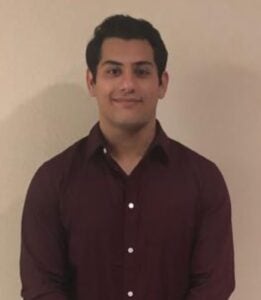Mo Hashemian
Education: B.S. Biological Sciences, University of California, Irvine, 2019 
From: Irvine, California
Joined David Lab: January 2021
Outside of lab: working out, watching TV
Research in David Lab:
In the lab, I utilize techniques in molecular and structural biology, protein biochemistry and enzymology. These skills were cultivated and applied in the process of solving the first full-length structure of an important human base excision repair glycosylase, MUTYH. This work has enabled us to characterize many functional features of the enzyme but has raised additional questions pertaining to the coordination of a zinc ion which is missing from the structure. My current work involves characterizing the structural motif that binds zinc, as well as characterizing naturally occurring cancer variants surrounding this motif. Our structure of MUTYH has also informed a second project, involving the potential discovery of a small molecule inhibitor that binds to a C-terminal substrate recognition motif, thereby diminishing enzymatic activity.
